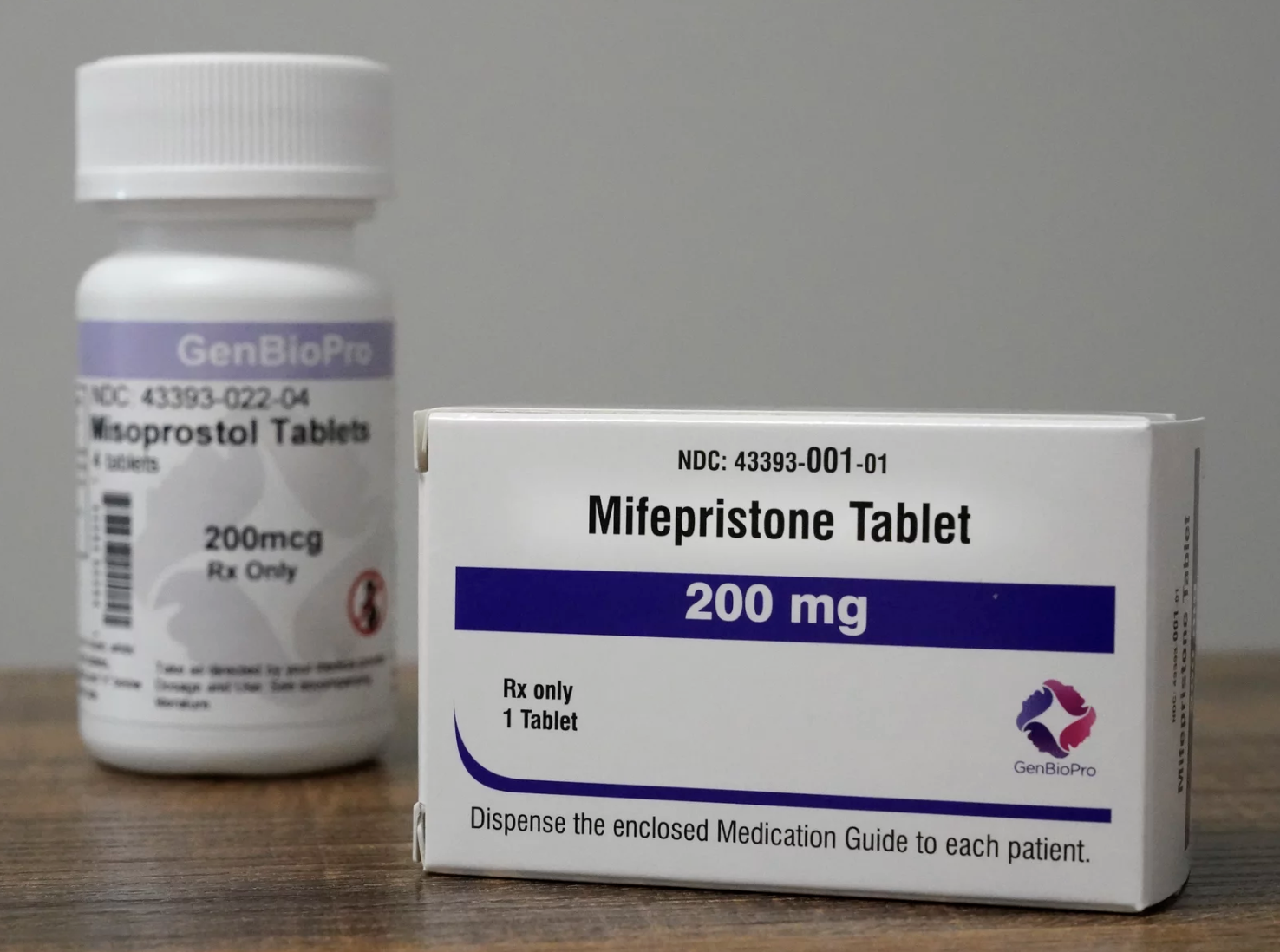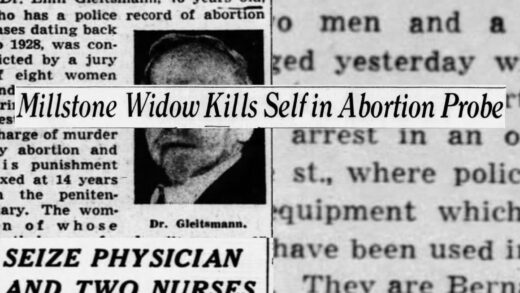by Ace Clarkson

In this podcast, I (Ace Clarkson) discuss the legal and historical connections between the trans rights and reproductive healthcare movements. I also discuss the ways the horror genre has always viewed forced pregnancy as a horrific act and how this has recently expanded to include the idea of trans people.
Transcript
(Brief Opening Jingle)
ACE: Hello! My name is Ace Clarkson, I use They/He pronouns, and I am a student at Smith College. I’m coming to you from my Study of Women and Gender class with a topic near and dear to my heart. Today, we’re discussing two very intertwined causes, reproductive and LGBTQ+ rights. Both of these have a lot to do with bodily autonomy and people being allowed to take care of their own bodies how they see fit, but oftentimes people assume they’re distinctly different issues. Ironically, the legal case for both springs from the same precedent.
ACE: Griswold v Conneticut was a landmark case, which happened in the 60s. It established the concept of a right to privacy. Essentially, the government isn’t entitled to what is happening in your bedroom. Griswold’s verdict allowed free use of contraceptives by individuals. Two majorly famous cases then spawned from Griswold’s precedent, years later. You’ve probably heard of Roe v. Wade and Obergefell v. Hodges. Roe, though it has since been overturned, struck down complete abortion bans, and Obergefell legalized marriage between same-sex couples nationwide. The root of queer marriage rights and the legalization of abortion is the same case. So why do the fights feel notably distinct from each other?
(Music)
ACE: For a long time, the feminist movement has been, well, very bad at accepting anyone who didn’t fit their view of an ideal woman. Lesbians, people of color, and working class people, have all at one point or another been excluded from the core feminist movement. Some radical feminists are entirely anti-men. Trans people and gender nonconforming people teeter on the gender boundaries that these radical feminists ascribe value to, and therefore are sometimes disliked by the movement. TERFs, or trans-exclusionary radical feminists, are a small sect of feminists who intentionally exclude or actively work against trans people.
ACE: The idea to tie these two movements together isn’t new, however. In the early 2000s, Causes in Common was founded. Causes in Common was a national coalition that sought to start connecting queer people, specifically gay men and lesbians, to the fight for reproductive justice. Queer people have long fought for equal ease of access to things like IVF or surrogacy, so this coalition was a natural next step in the process. They held a conference in DC where they discussed how to combine the ideals of reproductive justice and queer rights. Unsurprisingly, it wasn’t very difficult to see overlaps.
ACE: A more modern idea has been the inclusion of trans people in reproductive justice. Trans people still need reproductive care just as much as anyone else. For one, Abortion clinics also tend to serve people who need gender affirming hormones. Trans men, unless they have had bottom surgery, are still capable of getting pregnant. For a trans man, pregnancy can be incredibly dysphoric on top of other possible complications. A lot of time, doctors aren’t equipped to deal with someone who is pregnant who doesn’t fit the usual standard of a pregnant woman. Even a trans man who actively want to be pregnant will face a lot of judgement, medical cruelty, and possible complications with the pregnancy.
(Music)
ACE: An interesting place to consider for how society is grappling with a particular issue is the horror genre. Horror tends to reflect what the current fears of a given population are. This can be seen in the gothic horror genre of days past, where the monsters and villains tended to represent free people of color. That was the overarching fear of white writers at the time, and therefore, they made it into horror. Many modern horror projects have to do with the fear of abortion, birth, and forced pregnancy.
ACE: Two specific horror projects which should be considered in this discussion are Alien (1979) and You Weren’t Meant to Be Human, an upcoming book by trans author, Andrew Joseph White. Alien is very clearly about the horrors of forced pregnancy, with alien creatures that incubate within hosts and then explode out of their chests. Alien came out after the establishment of Roe’s precedent, which means it was less of a reaction to the horrors of lack of abortion and more a retrospective. You Weren’t Meant To Be Human, however, is from the modern post-roe perspective. It is not out yet, but it will deal with the concepts of being pregnant while trans and forced pregnancy. It is supposed to grapple with the mental health issues this can cause, as well as the ways in which systems of oppression make it harder to exist as a pregnant trans person. These issues are impactful to not only us, but our legacy in the media we create.
(Music)
ACE: The fight for reproductive rights and trans rights overlap heavily, from their legal roots in Griswold v Connecticut to the way they’re portrayed in historical and modern horror. It’s only a social divide which keeps them separate as movements that don’t overlap in the modern view. They also impact what stories we find impactful to tell, as seen with Alien and You Weren’t Meant To Be Human. The connections between trans people and the need for abortion access run deep. It is critical that trans people support reproductive rights as we move into a terrifying new presidency. With solidarity, we will make it out stronger than ever.
Thank you for listening!
(Closing Music)



References
Bior, Ayen. “How the Reversal of Roe v. Wade Could Impact the Transgender Community.” NPR, NPR, 5 May 2022, www.npr.org/2022/05/05/1096365879/roe-wade-abortion-transgender-scotus-marriage-contraceptives-privacy-rights.
Carmen Vázquez Papers, Sophia Smith Collection, Smith College, Northampton, Mass. https://findingaids.smith.edu/repositories/2/archival_objects/483149 Accessed November 25, 2024.
Cobbs, John L. “Alien as an Abortion Parable.” Literature/Film Quarterly, vol. 18, no. 3, 1990, pp. 198–201. Arts Premium Collection; Literature Online.
Gruberg, Sharita, and Josia Klein. “Bans on Abortion and Gender-Affirming Care Harm the LGBTQ+ Community.” National Partnership for Women & Families, 11 Sept. 2023, nationalpartnership.org/bans-abortion-gender-affirming-care-harm-lgbtq-community/.
“How Will Roe v. Wade Reversal Affect LGBTQ Rights? Experts, Advocates Weigh In.” NBCNews.Com, NBCUniversal News Group, 24 June 2022, www.nbcnews.com/nbc-out/out-news/will-roe-v-wade-reversal-affect-lgbtq-rights-experts-advocates-weigh-rcna35284.
Koyama, Emi. “The Transfeminist Manifesto.” Catching a Wave, Northeastern University Press, 2003, pp. 244–259.
Lewis, Gabrielle. “How Roe v. Wade’s Overturn Affects Trans and Nonbinary People Who Can Get Pregnant.” CNS Maryland, CNS Maryland, 19 Oct. 2022, cnsmaryland.org/2022/10/18/how-roe-v-wades-overturn-affects-trans-and-nonbinary-people-who-can-get-pregnant/.
Roe v. Wade Case Summary: What You Need To Know – Findlaw, supreme.findlaw.com/supreme-court-insights/roe-v–wade-case-summary–what-you-need-to-know.html. Accessed 26 Nov. 2024.
Rose Mackenzie, Arli Christian. “The Intertwined Future of Attacks on Abortion and Gender-Affirming Care: ACLU.” American Civil Liberties Union, 6 Apr. 2023, www.aclu.org/news/reproductive-freedom/the-future-attacks-abortion-gender-affirming-care-lgbtq-rights.
Scott, Brianna. “Getting an Abortion as a Trans Person Is Hard – with or without State Restrictions.” NPR, NPR, 18 Oct. 2022, www.npr.org/2022/10/18/1129736018/getting-an-abortion-as-a-trans-person-is-hard-with-or-without-state-restrictions.
“Voices of Feminism Oral History Project, Sophia Smith Collection, Smith College Special Collections, Northampton, Massachusetts.” https://findingaids.smith.edu/repositories/2/archival_objects/89301 Accessed November 25, 2024.
Yoor, Kelsey. “Movie Monsters through the Years: How Does Horror Reflect Historical Fears?” CBR, 2 June 2022, www.cbr.com/movie-monsters-horror-decade-reflection/.


